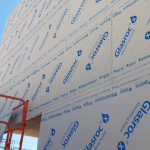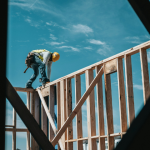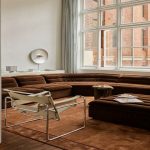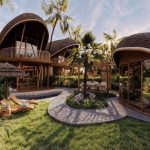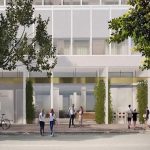Bringing nature into Post-Covid homes
One of Australia’s top developers is calling on the residential development industry and the Government to rethink building design standards so that they better foster physical and mental wellbeing in the post-Covid world.
Crown Group Chairman and Group CEO Iwan Sunito says the pandemic has forced many people to spend far more time in their homes, which has created a more urgent need to design them to better encourage a sense of calm, relaxation and productivity.

GALLERY





“Many people are spending more time working from home, studying from home, home-schooling their children and exercising and recreating,” he said. “People who live in well-designed homes that offer plenty of living and working space, access to gardens and fresh air, as well as facilities such as play areas, fitness facilities and music rooms, have been far better able to adjust to this new lifestyle.
“Good developers are competing in this space – wellness real estate is worth an estimated $134bn, or 1.5 percent of global construction, according to the Global Wellness Institute. But unfortunately, not all homes are designed this way – and residents can literally feel the difference.
“The pandemic must force a rethink of house and apartment design so that all residents are able to feel secure, relaxed and socially connected when they are at home. This ultimately will lead to better physical and mental health around the world. The hotel industry puts a great focus on wellness; the residential industry needs to too.
“It’s not just about sustainable buildings but a sustainable lifestyle.”
Mr Sunito said one of the first steps should be for developers and designers to bring nature into buildings – greenery, water, natural light and fresh air. “Numerous studies around the world have proven that being among nature can improve our mood and even our intelligence,” Mr Sunito said. “One of the largest universities in the world, the University of Minnesota, has studied nature’s effects on people’s peace of mind in its biophysical department. “Their studies proved that nature makes people feel more in tune with themselves and has the ability to heal, restore and connect people. “Just like the sound of water can soothe us and help us sleep, loud noises like traffic can ignite our fight-or-flight response and increase our stress levels.
“Nature can also be good for our cognitive functions – a walk in a forest, for example, can help our emotional regulation and memory functions.”
Mr Sunito said that Crown Group had always designed its apartments with its signature resort-style facilities, to provide a relaxing and healthy environment for its residents. It had not anticipated how well this approach would suit the needs of the post-pandemic world.
“Even long after this pandemic is over, people will be working more from home, so these are needs that will endure,” he said. “People will need more common areas for co-working and socialising in a safe space. And they will need nature around them.
“Our development Waterfall by Crown Group development in Waterloo has become an ideal model for biophilic design, with corridors that are open to the elements to let fresh air in as well as balconies at each apartment. There is ample outdoor space for residents to relax including 2600sqm of tropical gardens with more than 7000 plants in the vertical green walls alone. The development also contains Australia’s tallest constructed waterfall at 22 metres in high, creating soothing water sounds.
“The cantilevered gym, 25m-lap pool and spa with 49 jets offer sweeping views, a music room and function room offer spaces to relax and practice a skill, both so important for one’s wellbeing.”
Mr Sunito said all of Crown Group’s developments were naturally suited to residents’ wellbeing.“Our developments tend to lend themselves to a healthy lifestyle, being built on big landholdings of up to 2.5 hectares, and with abundant gardens and water features, as well as large balconies and courtyards for residents to enjoy fresh air,” he said. “Many of our developments also offer precinct-style living, where you often don’t need to leave to do your groceries or go to the doctor or hairdresser. They allow you to stay close to home, dining out or ordering food delivery from the precinct.”
Waterfall by Crown Group resident Kim said that moving into the development had relieved much of the stress of moving house and pandemic-related changes to her way of life. “Living here is like being in a slice of tranquil heaven among hectic high-density living,” she said. “It is largely to do with having so many facilities and common areas – with the gardens and the pool, there are so many spaces where you can feel at peace and people need that, particularly right now.”
Urbis Director of City Strategy and Place Michael Stott said while the pandemic would lead to greater demand for living spaces with more flexible zones to accommodate working from home and shared common areas, access to nature, the outdoors and natural light, it could also change the priority people put on their home’s location. It could also spell a rethink of open plan living in its current form. “In the future, we’re going to see a change in where families decide to buy or rent. Previously, key deciding factors included access to state or private schools or an easy commute to work. This also meant people were willing to pay a location premium, particularly in areas of high amenity. They would subsequently adapt where they chose to live to fit their needs rather than the other way around. “What will likely change as we move through Coronavirus and things settle into a new normal, is that where people choose to live will start to come second to how they want their home to function.”
He said that working from home during lockdown had highlighted that families needed more working and personal space. “I’m sure many families can relate to how challenging it is to find any personal space – let alone space for yet another webinar, Zoom or Teams meeting – when your entire family is using the same area,” Mr Stott said. “The pandemic may even signal a move away from open plan living that relies on a phased model of using space, where different family members use the home at different times of day. “Lockdown has created a concurrent pattern of occupation, where all members of the household occupy the home simultaneously.”
Mr Stott said people were now reflecting on how they relate to each other as well as the value of physical access to open spaces and nature. “It’s widely accepted that, even in small doses, green spaces – whether parks, playgrounds or residential greenery – are essential for our well-being and mental health,” he said. “Throughout the pandemic, we’ve all seen the value and joy of public spaces around the country have brought people, even while physically distanced. There is also growing recognition of the crucial role green spaces play in urban areas, particularly in high-density areas where residents don’t have direct access to open space. “What we don’t want is for people to perceive that their only ability to access green space is to escape the city. With limited opportunities to include further green spaces in the densest of Australia’s cities any opportunity to increase it should become a priority.”
Images Anthony Tzikas via Crown Group
CSR Gyprock has launched the Glasroc X Sheathing Board, a high-performance Class 4 vapour permeable rigid air barrier ...
Millions of dollars in long-service leave entitlements and ongoing liabilities might be owed by major businesses outside of ...
In a bold physical extension of its digital identity, ELLISON STUDIOS. has unveiled THE RENTAL 2.0—a fully immersive ...
In Ubud, Bali’s cultural epicentre and one of the world’s most competitive hospitality destinations, architecture studio Archigods has ...
A dormant luxury development in the heart of Adelaide is back on the agenda, with Carrington Collective lodging ...




